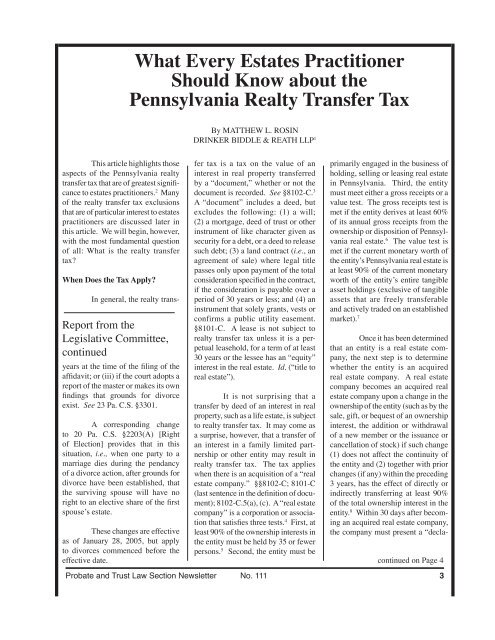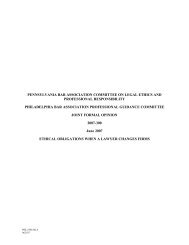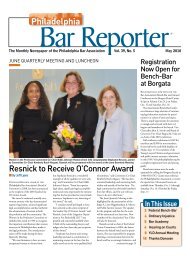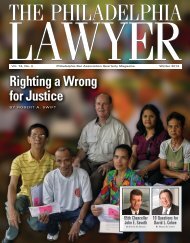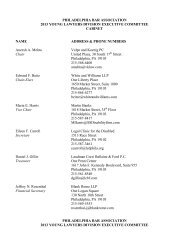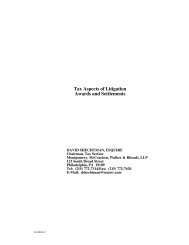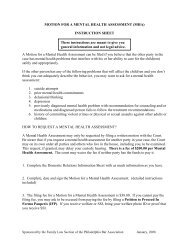Probate & Trust Newsletter: April 2005 - Philadelphia Bar Association
Probate & Trust Newsletter: April 2005 - Philadelphia Bar Association
Probate & Trust Newsletter: April 2005 - Philadelphia Bar Association
Create successful ePaper yourself
Turn your PDF publications into a flip-book with our unique Google optimized e-Paper software.
What Every Estates Practitioner<br />
Should Know about the<br />
Pennsylvania Realty Transfer Tax<br />
By MATTHEW L. ROSIN<br />
DRINKER BIDDLE & REATH LLP 1<br />
This article highlights those<br />
aspects of the Pennsylvania realty<br />
transfer tax that are of greatest significance<br />
to estates practitioners. 2 Many<br />
of the realty transfer tax exclusions<br />
that are of particular interest to estates<br />
practitioners are discussed later in<br />
this article. We will begin, however,<br />
with the most fundamental question<br />
of all: What is the realty transfer<br />
tax?<br />
When Does the Tax Apply?<br />
Report from the<br />
Legislative Committee,<br />
continued<br />
years at the time of the filing of the<br />
affidavit; or (iii) if the court adopts a<br />
report of the master or makes its own<br />
findings that grounds for divorce<br />
exist. See 23 Pa. C.S. §3301.<br />
A corresponding change<br />
to 20 Pa. C.S. §2203(A) [Right<br />
of Election] provides that in this<br />
situation, i.e., when one party to a<br />
marriage dies during the pendancy<br />
of a divorce action, after grounds for<br />
divorce have been established, that<br />
the surviving spouse will have no<br />
right to an elective share of the first<br />
spouseʼs estate.<br />
These changes are effective<br />
as of January 28, <strong>2005</strong>, but apply<br />
to divorces commenced before the<br />
effective date.<br />
In general, the realty transfer<br />
tax is a tax on the value of an<br />
interest in real property transferred<br />
by a “document,” whether or not the<br />
document is recorded. See §8102-C. 3<br />
A “document” includes a deed, but<br />
excludes the following: (1) a will;<br />
(2) a mortgage, deed of trust or other<br />
instrument of like character given as<br />
security for a debt, or a deed to release<br />
such debt; (3) a land contract (i.e., an<br />
agreement of sale) where legal title<br />
passes only upon payment of the total<br />
consideration specified in the contract,<br />
if the consideration is payable over a<br />
period of 30 years or less; and (4) an<br />
instrument that solely grants, vests or<br />
confirms a public utility easement.<br />
§8101-C. A lease is not subject to<br />
realty transfer tax unless it is a perpetual<br />
leasehold, for a term of at least<br />
30 years or the lessee has an “equity”<br />
interest in the real estate. Id. (“title to<br />
real estate”).<br />
It is not surprising that a<br />
transfer by deed of an interest in real<br />
property, such as a life estate, is subject<br />
to realty transfer tax. It may come as<br />
a surprise, however, that a transfer of<br />
an interest in a family limited partnership<br />
or other entity may result in<br />
realty transfer tax. The tax applies<br />
when there is an acquisition of a “real<br />
estate company.” §§8102-C; 8101-C<br />
(last sentence in the definition of document);<br />
8102-C.5(a), (c). A “real estate<br />
company” is a corporation or association<br />
that satisfies three tests. 4 First, at<br />
least 90% of the ownership interests in<br />
the entity must be held by 35 or fewer<br />
persons. 5 Second, the entity must be<br />
primarily engaged in the business of<br />
holding, selling or leasing real estate<br />
in Pennsylvania. Third, the entity<br />
must meet either a gross receipts or a<br />
value test. The gross receipts test is<br />
met if the entity derives at least 60%<br />
of its annual gross receipts from the<br />
ownership or disposition of Pennsylvania<br />
real estate. 6 The value test is<br />
met if the current monetary worth of<br />
the entityʼs Pennsylvania real estate is<br />
at least 90% of the current monetary<br />
worth of the entityʼs entire tangible<br />
asset holdings (exclusive of tangible<br />
assets that are freely transferable<br />
and actively traded on an established<br />
market). 7 Once it has been determined<br />
that an entity is a real estate company,<br />
the next step is to determine<br />
whether the entity is an acquired<br />
real estate company. A real estate<br />
company becomes an acquired real<br />
estate company upon a change in the<br />
ownership of the entity (such as by the<br />
sale, gift, or bequest of an ownership<br />
interest, the addition or withdrawal<br />
of a new member or the issuance or<br />
cancellation of stock) if such change<br />
(1) does not affect the continuity of<br />
the entity and (2) together with prior<br />
changes (if any) within the preceding<br />
3 years, has the effect of directly or<br />
indirectly transferring at least 90%<br />
of the total ownership interest in the<br />
entity. 8 Within 30 days after becoming<br />
an acquired real estate company,<br />
the company must present a “declacontinued<br />
on Page 4<br />
<strong>Probate</strong> and <strong>Trust</strong> Law Section <strong>Newsletter</strong> No. 111 3


